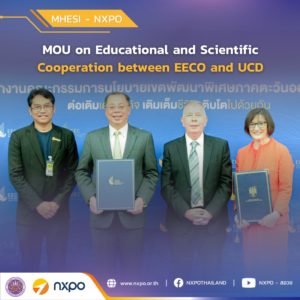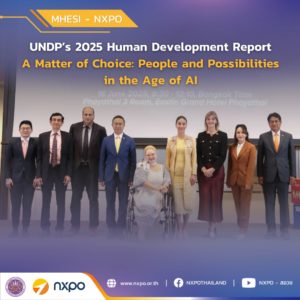NXPO President Dr. Kitipong Promwong was invited to give a talk in a forum organized by Phuket Rajabhat University on 8 December 2021. His talk focused on key issues in reinventing higher education.

Dr. Kitipong outlined the recent changes caused by the pandemic and digital disruption and how universities respond to these emerging challenges. The COVID-19 pandemic had a significant impact on the economy including the labor market. 25% of labor force were put on furlough, while 20% were laid off. As a result, universities need to make an urgent assessment on how best to prepare graduates to enter the tight labor market. The Ministry of Higher Education, Science, Research and Innovation (MHESI) has initiated reskilling and upskilling programs to develop workforce for industries that are expanding amid the pandemic, namely food, digital and logistics.
The rise of digital transformation means that universities should pay more attention to manpower development in the areas of data science, artificial intelligence (AI), e-commerce, robotics engineering, software engineering and automation to fulfill the market demand. In addition, careers in social work such as emotional support specialists, marriage and family therapists, career counselors and social workers are increasingly in demand.

In today’s customer-focused and digital era, customer experience is everything. Students have high expectation from universities in term of service quality and efficiency. Universities therefore must not treat students as mere learners, but as customers who can be impressed and remain loyal with good experience.
The multi-stage life and aging society trends call for continuous learning and thus universities will need to cater to – in addition to traditional students – current workforce that requires reskilling and upskilling. Higher education will therefore need to move towards lifelong learning and producing workforce with skillsets demanded by the labor market and immunity from crises. Majority of workforce needs to be upgraded to skilled worker, whereas senior and pre-senior groups should be turned into active aging workforce.

NXPO has concluded from its study that a paradigm shift needs to be made in Thailand’s higher education system as following: 1) from content-based to competency-based education, 2) from supply-driven to co-creation in which both educational institutions and employers work together to develop platform and curriculum, 3) from degree-oriented to employability-oriented education, 4) from catering to 3-stage life to meeting the needs of multi-stage life, 5) from institution-based to credit bank system, 6) from limited access to open access, 7) from local perspective to global perspective, 8) more accessible and affordable, 9) from supply side financing to demand directed financing, and 10) towards creative ecosystem.
A number of higher education innovations have been introduced in response to challenges. SkillsFuture Credit introduced by the Singaporean Government is a credit scheme for citizens aged 25 years and above to acquire new skills or improve existing ones. Generation Foundation model offers job matching for students. The merge of education and technology results in the creation of EdTech to design IT tools that facilitate and enhance learning. The university-industry co-creation is a model in which universities engage real-sectors and employers into the curriculum development and delivery.
Dr. Kitipong gave examples of recent initiatives launched to support manpower development endeavor. These include new criteria for academic promotion, higher education sandbox and Thailand Plus Package.
Phuket Rajabhat University sets its vision to develop human resources with identity, quality and high performance, aiming to integrate innovation to community development to strengthen the nation. The strategy consists of 4 areas: 1) community development, 2) manpower and teacher development, 3) education quality and 4) management system.







